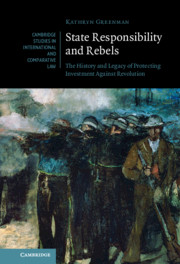Refine search
Actions for selected content:
4 results
2 - The System: Mixed Claims Commissions in the Shadow of Empire
-
- Book:
- State Responsibility and Rebels
- Published online:
- 13 August 2021
- Print publication:
- 26 August 2021, pp 36-68
-
- Chapter
- Export citation
3 - The Cases: Autonomy, Ambiguity and Doctrine in the Work of the Commissions
-
- Book:
- State Responsibility and Rebels
- Published online:
- 13 August 2021
- Print publication:
- 26 August 2021, pp 69-108
-
- Chapter
- Export citation

State Responsibility and Rebels
- The History and Legacy of Protecting Investment Against Revolution
-
- Published online:
- 13 August 2021
- Print publication:
- 26 August 2021
3 - Mixed Claims Commissions and the Origins of Central Concepts
-
- Book:
- Admissibility of Shareholder Claims under Investment Treaties
- Published online:
- 07 September 2020
- Print publication:
- 17 September 2020, pp 79-124
-
- Chapter
- Export citation
